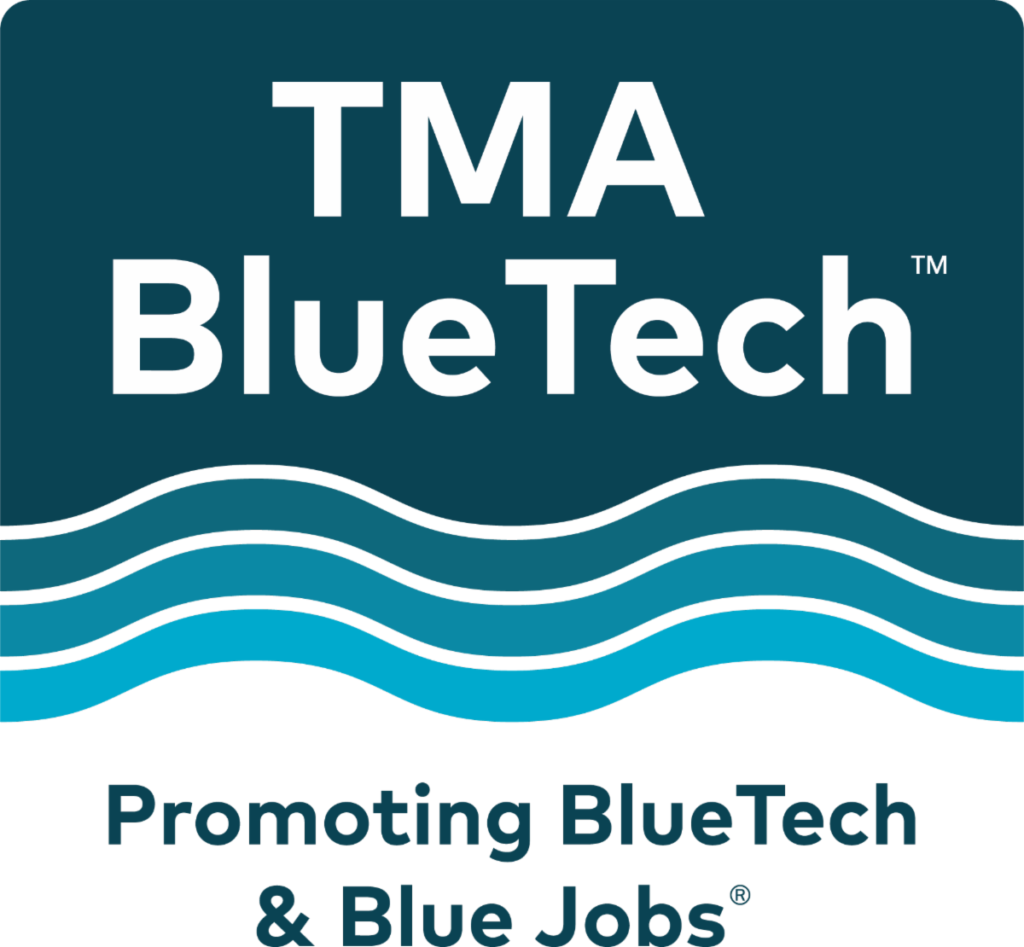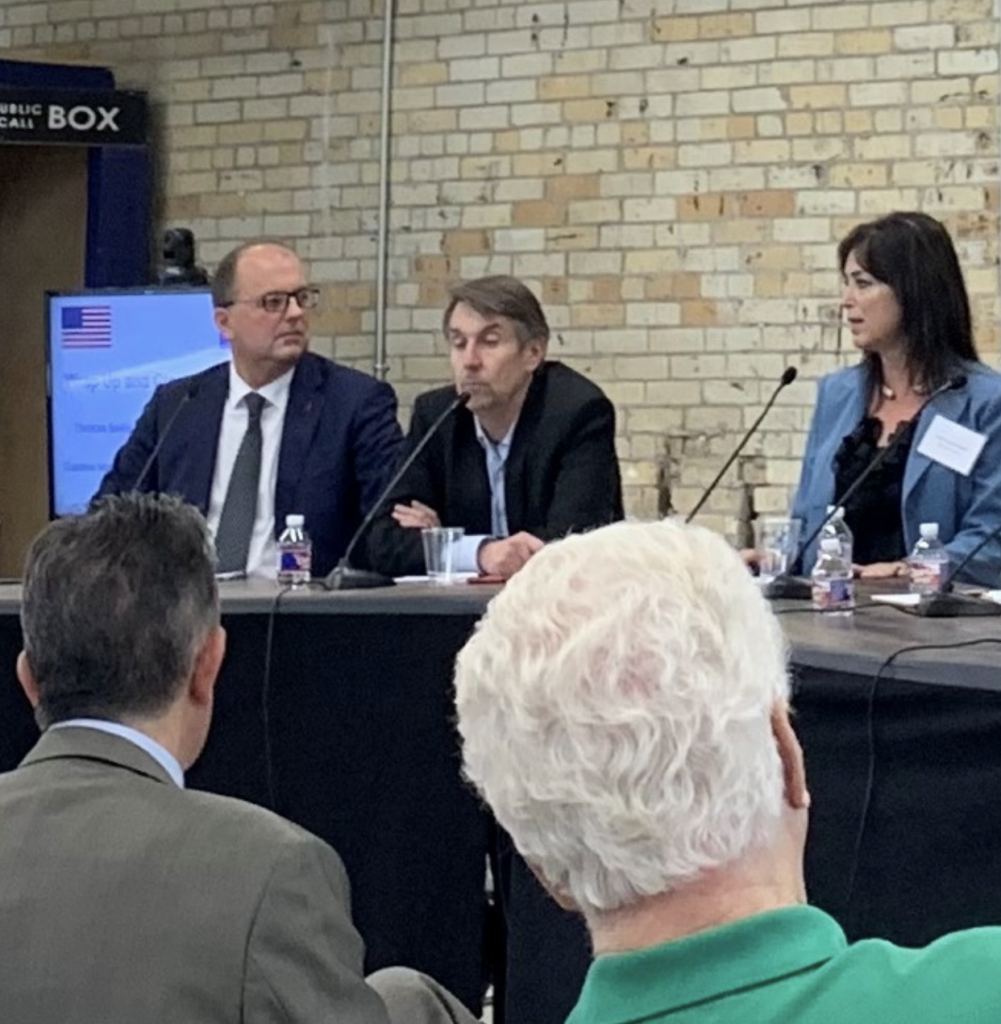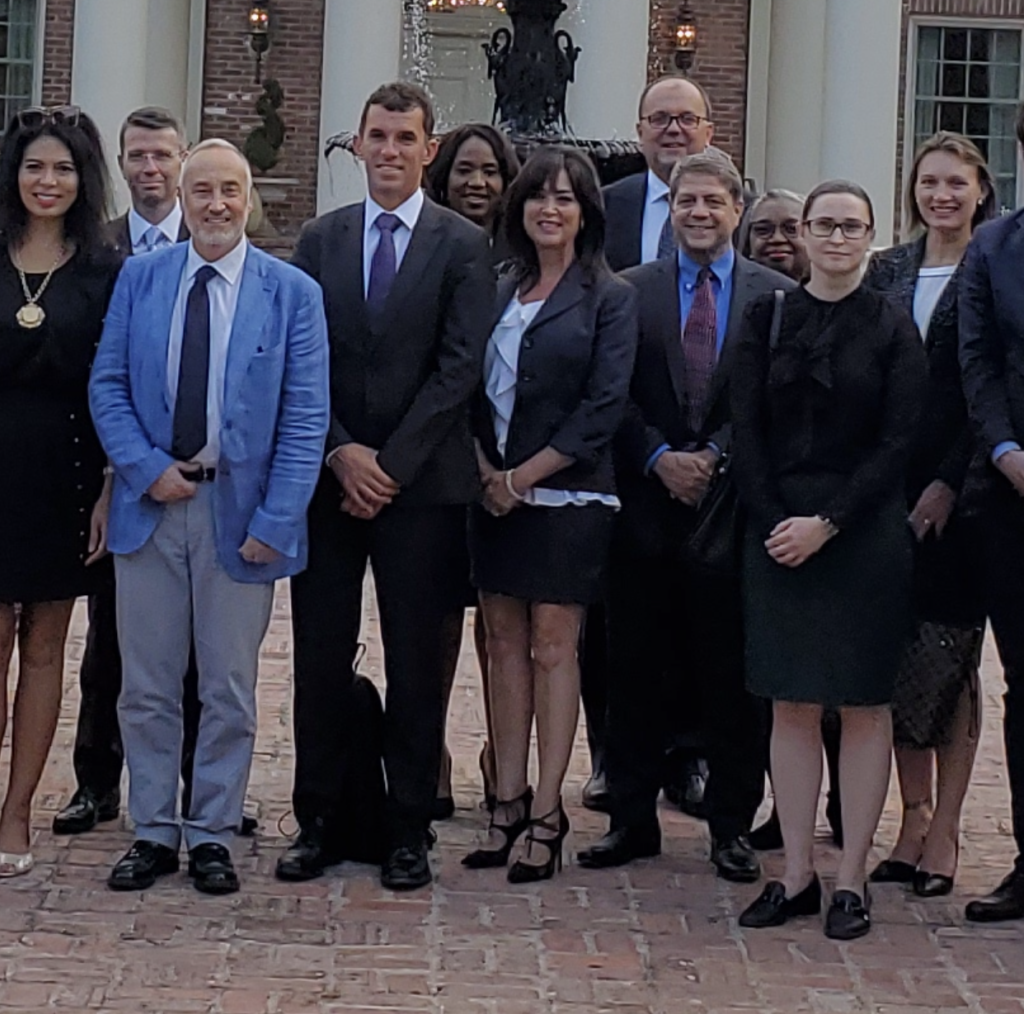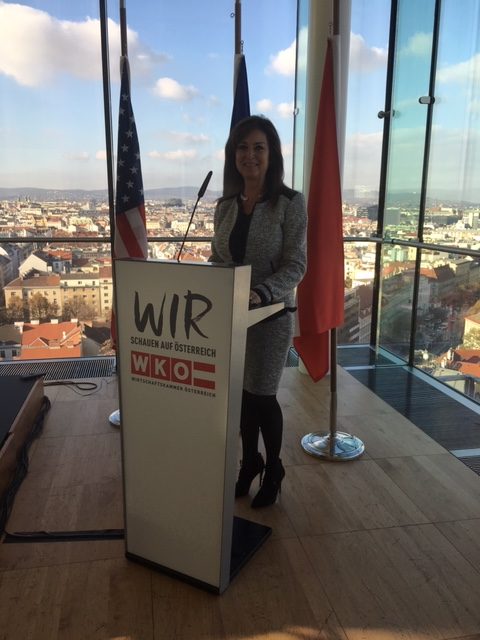Latest News and Media

Janet Angel Welch, CEO, JACOR LLC asked to speak at Blue Tech Week, one of the largest international oceanic conferences in the world. Dr Angel will present EcoBioClean technology and detail how it supports the United Nations 2030 Agenda for Sustainable Development, a plan of action for people, planet and prosperity, on Thursday, November 21, 2019 in San Diego. She will be joined by oceanic and environmental experts from around the globe.”

Janet Angel Welch- CEO of JACOR LLC represented Small and Moderate Business Innovation leaders as an invited panelist and Delegate Member for the United States-European Union SME Workshop In Little Rock, Arkansas September 18 &19th. She presented her patented technology EcoBioClean, discussed international business challenges, met with both Mayors and other government officials, international business leaders, and attended a special dinner at the Governor ‘s Mansion with Governor Hutchinson And the First Lady.

EcoBioClean® inventor, Janet Angel, CEO, was chosen by the United Nations as one of just two United States innovations to make a presentation alongside international chemistry Nobel Prize Laureates at the Green Chemistry conference held (UNEP/UNIDO/ISC3) in Berlin, Germany in September 2017. Janet Angel, CEO of JACOR, LLC was also invited to make a presentation to the European Union SME Conference in October, 2017 where she discussed her innovation (EcoBioClean®) and the challenges small businesses face in the USA.


Oil and Chemical Contamination: Reimagining the Way We Deal with Environmental Catastrophe
The Korean Peninsula has been at the forefront of the global geopolitical agenda in recent months. Increased tensions between North Korea on one side, and Japan, South Korea, and the United States on the other, have led to led to almost unprecedented levels of worldwide anxiety, particularly as much of the rhetoric hints heavily at – or even directly references – the use of nuclear force.
It was beneath this landslide of heavy words and provocative action that another headache for the United States military, and for our planet as a whole, was buried. In October 2017, soil and groundwater test results for the military base of Camp Market in Bupyeong, Incheon were released. Of the thirty-three areas around the base which were subjected to testing, seven were found to have dioxin levels of above 1,000 pg-TEQ/g. The sample with the highest dioxin content was found to have 10,347 pg-TEQ/g; a level which poses a severe risk to humans and to the surrounding environment.
Other contaminants found at dangerously high levels within the samples collected were total petroleum hydrocarbons (TPH) polychlorinated biphenyls (PCB), tetrachloroethylene (TCE), trichloroethylene (TCE) benzene, and heavy metals.
The fact that Camp Market is the site of serious contamination is already well-established. The base and military depot has been closed for some time, after a survey from July 2015 to March 2016 found severe levels of environmental pollution within the US-administered compound. However, further tests have confirmed fears that the contaminants have indeed polluted the area immediately adjacent to the base, and perhaps beyond.
Bupyeong is not an isolated location. It is a suburb of Incheon; a city with a population of 3 million. The pollution from the military base poses a significant risk to the people living close by, as well as to the water table and to the local environment. While this may not register as highly on the global news radar as the threat of thermonuclear war from north of the 38th parallel, it still represents a serious issue which must be addressed.
A Step Beyond Traditional Cleaning
Unfortunately, the example of the debacle in Incheon is not an isolated one. A study published by Bloomberg in 2014 found that up to 10,000 tonnes of chemicals are leaked into American waters annually, while the National Oceanic and Atmospheric Association’s (NOAA’s) Office of Response and Restoration estimate that an oil spillage of some description occurs on a US-administered waterway at least once every single day.
The traditional response to such a catastrophe is to initiate a cleanup operation. The methods used in such operations range from the rudimentary – the deployment of spill containment berms which either sit flush at ground level or float on the surface of a body of water, preventing the spread of contamination, for example – to the more sophisticated; the release of dispersal agents into the contaminated area to break down the chemicals and make them easier to deal with.
These methods may appear to be very different in nature, but they each approach the problem from the same angle. They all seek to mechanically contain or remove the chemical contaminant, in just the same way we would if we spilled an oil-based substance at home, just on a far greater scale.
The problem lies in what comes next. Containing a spillage is only a temporary measure; the contaminants must still be disposed of in a safe and effective manner. The use of dispersal agents does not remove the contaminant; instead, it is merely broken down. Research from the Conservation Institute suggests that this deconstituted material may, in fact, be more damaging to coral structures and other species than spilled crude oil itself.
It would also be difficult to contain and disperse toxic chemicals at a site like Camp Market without large-scale evacuation of the area. The dispersal agents are potentially harmful and damaging to organic life themselves and are wholly unsuitable for use in an urban location, or in any location in which people and animals live.
With this in mind, it soon becomes clear that we need to move beyond traditional cleaning and containment methods, instead looking towards something more effective, more efficient, and far kinder to our environment.
Reimagining the Cleaning Process
Rather than desperately dispersing the flow of oil and chemical contaminants via artificial means, it should instead be possible to use biological agents and green technology to neutralize the threat they pose.
This was the thought which motivated Janet Angel, an environmental scientist who has worked to redefine and reimagine the process of cleaning up contaminants. Incidents like the ongoing one at Camp Market in Incheon, and the shocking statistics published by the NOAA, have underlined the scale of the problem we face, and have made it clear that contemporary best practices and recommended responses are simply insufficient.
Janet Angel’s EcoBioClean represents a potential solution and is designed as a green and sustainable means to combat environmental contamination. Using biological compounds which reverse engineer the toxic chemical contaminants, EcoBioClean has been shown during testing to render such chemicals harmless, or even beneficial to local ecosystems.
Field testing for the innovative green technology began in 2010 in the most tragic circumstances possible. In July of that year, the Deepwater Horizon oil rig suffered an uncontrollable blowout of crude oil, resulting in a catastrophic explosion and the release of 4.9 million barrels’ worth of oil into the Gulf of Mexico.
The treatment quickly proved successful, and the oil which EcoBioClean came into contact with, as well as the dispersal agent, was remediated and rendered harmless.
Supporting Technology with Behavioral Shifts
Innovations such as EcoBioClean represent a step beyond what was previously considered possible in terms of ecology and environmental disaster response. Rather than ‘mopping up’ crude oil and other contaminants, this solution actively works to neutralize them in a way which supports and protects the environment local to the spillage.
But it cannot be effective in isolation. While this method of cleaning and dealing with contaminants offers a major movement in the right direction, it must be supported by – and deployed in tandem with – a seachange in terms of behavior and attitude.
We have already discussed how oil spillages and contaminations, of various sizes, occur each and every day in the United States. We have already explored how dubious practices and a lackluster approach to environmental safety has put lives in jeopardy near a US military base in South Korea. It is evident that something needs to change.
Even the most innovative of clean-up and containment methods are, in their very essence, reactive responses to catastrophe. In order to take genuine, positive steps towards a more stable and secure environmental situation in the future, humanity as a whole must take a more responsible position on spillage and contamination.
This must take place on an institutional level, through the introduction of stricter legislation governing the treatment and handling of hazardous materials, and increased corporate responsibility for the substances which businesses work with. However, it must also take place on a personal level, through education, and through a heightened sense of duty of care for our environment.
It is behavioral shifts like these, working alongside more innovative, sophisticated, and environmentally friendly clean-up techniques, which represent the future of dealing with toxic spillage and contamination.
Pioneering Chicago Researcher to Present Ground Breaking Green Chemistry Innovation to United Nations
Janet Angel’s EcoBioClean Recognized for Potential to Transform Treatment for Oil and Petrochemical Spills®
Chicago (September 6, 2017) — Barrington, IL resident Janet Angel, CEO of JACOR LLC, has been selected to present a best practices case study discussing the scientific and
ecological value of her patented EcoBioClean® technology before the United Nations Environment Programme (UNEP), the leading global environmental authority. Angel’s inventive discovery, a safer, less costly way to treat oil spills, was prompted by the devastating harm caused to the ocean following the Deepwater Horizon incident seven years ago.
Angel is one of only seven international entrepreneurs (and one of only two representatives from the United States) chosen by UNEP and the International Sustainable Chemistry Collaborating Center (ISC3) to speak at a joint workshop on September 14, 2017 in Berlin. The workshop is intended to advance entrepreneurship and start-up initiatives for sustainable chemistry. Participants will include Nobel laureates and other leaders from the environmental and scientific community.
Angel, whose background is in human chemistry, set about developing the EcoBioClean® technology shortly after the 2010 Deepwater Horizon disaster. Her cost-effective, comprehensive green chemistry application rapidly (under ten minutes) reduces a crude oil slick in salt or fresh water to tiny particles. It continues to biodegrade and transform those substances into beneficial materials suitable for aquatic or ground life with total remediation occurring in as little as seven days. The process is analogous to the way microorganisms break down organic waste into the chemical energy and nutrients needed for cellular maintenance and growth.
“As I considered what happened to the ocean following the Deepwater spill, I thought, ‘why not remove toxins from the ocean the way microorganisms and enzymes break down substances in nature?’” Angel explained.
Until now, attempts to treat toxic oil spills relied on methods that included burning off the floating layer of oil, using chemicals or churning the slick with spinners to disperse it, or employing soakers or booms to collect the oil and send the waste to landfills. But these approaches are unable to restore many sites to the public health and the environment standards set by environmental regulators.
Further, cleanup is costly. In 2010, Over 200 million gallons of crude spilled into the Gulf and spent over $60 billion in cleanup costs. Treatment of the spill via EcoBioClean® would have cost $1.02 billion, one-sixtieth (1/60th) the cost.
“Despite preventative measures, there will continue to be oil and petrochemical spills due to accidents on drilling rigs, human error, degradation of underground piping, natural disasters, and more,” said Angel. “But we now have the benefit of promising technology that can mitigate this harm, reducing human health risks and protecting our environment,” she added.
“I look forward to sharing our approach with the global scientific community at the U.N. and with other leaders in the public and private sectors in the near term,” Angel said.
###
Turning Crude into Food
Ground breaking patented technology rapidly cleans contaminated oceans and freshwater while converting crude oil into food.
CHICAGO, IL — Today, at JACOR, LLC Headquarters, CEO Janet Angel and her team of scientists announced immediate availability of EcoBioClean® for purchase, license and distribution. EcoBioClean far exceeds the typical “out of sight out of mind” crude oil cleanup methods as it reengineers an oil slick quickly into pepper sized nutrient-rich particles that can be consumed by fish and other species. Unconsumed EcoBioClean particles will biodegrade into harmless carbon dioxide and water.
This scientific breakthrough also solves an integral part of the global contaminated drinking water crisis. When applied to wells and pipelines polluted by toxic hydrocarbons, this technology purifies directly at the problematic source and restores safety and cleanliness to our water supply.
“We must diligently work to preserve our natural resources especially after a chemical disaster, treating our oceans and other ‘bodies of water’ as sensibly as we would the human ‘body.’ EcoBioClean works quickly to make a toxic spill safer and beneficial without the use of chemicals. Our newly patented green technology is also proudly produced in the USA,” said Angel, a biochemist and EcoBioClean inventor.
Positive Customer Impact
In reviewing EPA guidelines for acceptable performance, EcoBioClean far surpasses the speed, effectiveness and safety of other systems, and unlike currently used chemical dispersants, spinners, soakers or burning techniques, this important new technology has an advantageous effect on the life cycle all the way up the food chain to humans. Companies can save money, time and the damaging carbon imprint other methods may leave behind. EcoBioClean preserves our natural resources and has value in numerous industries.
Examples of applicable uses include on fuels, oils, and tar balls that wash ashore as well as those spilled by ships, boats or on land by trains, trucks, autos, airplanes or at gas pumps. The formula is effective in a wide range of temperatures and under extreme conditions, and in uncountable locations where contamination may occur from vast oceans to landfills and water sources that provide drinking water.
Angel was recently awarded a US Patent for both the formula and methods of use. The issuance, itself a laborious and rigorous process, establishes the utility and novelty of the EcoBioClean composition.
The first field application test of EcoBioClean was in July of 2010 in the ocean off the coast of Grand Isle, Louisiana, after the Deep Water Horizon Spill had occurred. During that visit, Angel’s formula was applied to crude oil slicks that collected in Barataria Bay in the Gulf of Mexico. The crude oil had also been treated by the dispersant of choice.
***
ABOUT EcoBioClean
EcoBioClean is a green technology that naturally and quickly reverse-engineers and converts toxic chemicals, such as crude oil, into harmless elements. In effect, EcoBioClean is “turning crude into food” for smaller and greater organisms that exist in bodies of water and soil globally. This technology not only works to remediate crude oil, it is effective on a wider scope of petrochemicals and petroleum products, including auto, airplane and marine fuels, methane and products made from petroleum, such as various type of plastics and more.
ABOUT THE INVENTOR & HER TEAM
Janet Angel is a scientist, wellness expert, inventor, lecturer, author and entrepreneur with more than 25 years of clinical experience working diligently to improve life worldwide by using the genius of nature. She is currently CEO of JACOR, LLC, an eco-friendly environmental solutions company aligning science with nature to solve issues of contaminations around the globe. She is well known in the field of nutritional science and is a frequent media guest, writer, sought-after speaker and advocate for healthier living.
Scientific Research and Development Team includes nationally recognized legal experts and scientists in the fields of Biology, Chemistry, Microbiology and the Oil/Gas Industry.
